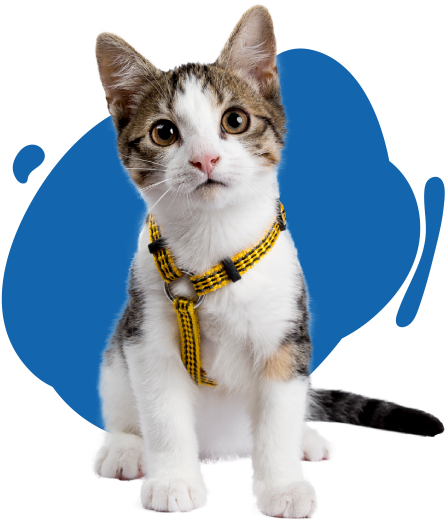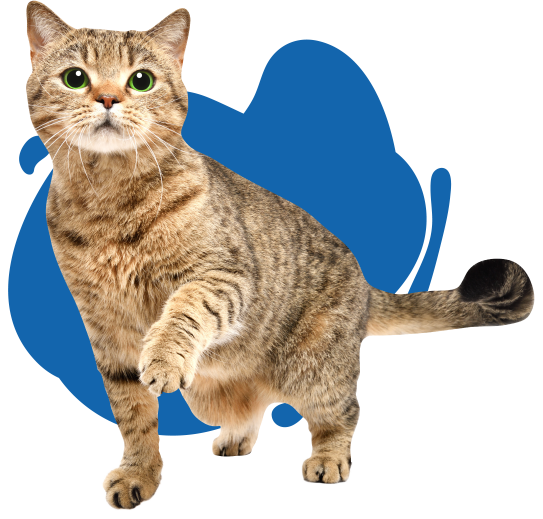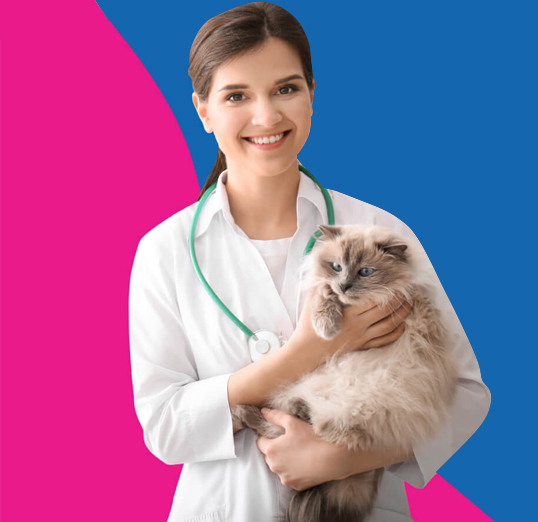Kitten and Cat Veterinary Services
“Discover the services we have available at Sugarland
Animal Hospital in Bundaberg for your feline friend”
Why Are Cats Great Pets?
Cats are playful yet independent pets that are perfect for people of all ages. Their easy going, gentle nature makes them great companions. Cats live a very clean and low maintenance lifestyle, which means that they are comfortable living in a wide variety of homes, from houses to apartments.
There are many different cat breeds available to have as pets in Australia, and at Sugarland Animal Hospital, we can help you with all of them!


How we can help you with your kittens and cats
The long-term health of your cat is maintained through a nutritious diet, daily exercise, and regular health checks. Over time, as your cat ages, it’s health needs will change and at Sugarland Animal Hospital, we’re here to help make looking after your feline friend easier.
We offer a wide variety of veterinary services for kittens and cats of any age. Some of the service we offer include:
- General Health Check Ups
- Emergency Care
- Feline Vaccinations
- Microchipping
- Desexing
- Surgical Services
- Blood tests and Pathology
- X-rays
- Dental Care
- Intestinal Worms, Fleas and Heart Worms
- Prescription Diets
- Advice for Cat Behaviour


Why Choose Sugarland for your cat’s health?
At Sugarland we know how important your pet is, that’s why we treat every pet that visits us as if they are our own. Our aim is to ensure that your pet is nurtured, healthy and happy.
We also know how stressful a visit to the vet can be for both you and your pet, so our highly qualified and experienced veterinary team work closely with you to ensure we understand the needs of both you and your pet.
If you’re looking for high quality care for your cat in Bundaberg, the veterinary team here at Sugarland Animal Hospital is the right team for you.
Book an Appointment NowAs Bundaberg's ONLY Gold Accredited Cat Friendly Clinic We Offer:
- Dedicated CAT ONLY waiting & consult rooms to avoid fear and stress from dogs & other animals.
- Specialist veterinarians who understand the special needs & health of CATS.
- Calming pheromones inside the clinic to ensure your cat has a relaxing experience.
- Easily accessible, disabled-friendly parking and clinic access.
- Complete, thorough examinations with every visit to detect health issues early.
- Detailed reports on your cats health with a custom health plan for your records.
- Expert medical advice from fully qualified, caring professionals who care about the long term health and happiness of your cat.
Frequently Asked Questions
-
What kinds of cats do you treat?
At Sugarland we treat all breeds of cats including but not limited to:
- Burmese Cats
- Siamese Cats
- Domestic Short Hair Cats
- Domestic Long Hair Cats
- Russian Blues
- Maine Coon Cats
- Persian Cats
- Ragdoll Cats
- Scottish Fold Cats
- Sphynx Cats
- Tabby Cats
We also treat cats of all ages, including kittens, adult cats and senior cats.
-
What are some common illnesses and diseases that can affect cats?
There are many different illnesses that can affect cats. Some of these are more serious than others in nature. Some of the diseases and illnesses that can frequently affect cats include:
Cancer
Like humans, cats can be affected by a wide variety of cancers. There is no single known cause of cancer, and it can be localised, where it is confined to one area of the body, or it can be generalised, where it is spread throughout the body.Cats can also get a form of skin cancer known as squamous cell carcinoma. This most commonly affects lighter coloured cats and is usually caused by repeated exposure to the sun.
Diabetes
Cats can be affected by diabetes, which is caused by either the inability to respond properly to insulin or there is a lack of insulin. Insulin helps to carry glucose and other components from the cat’s food into its cells. However, when the cat is unable to produce insulin or its body doesn’t process it properly, it can affect the blood sugar levels, which can lead to further health complications.Feline Immunodeficiency Virus (FIV)
Feline Immunodeficiency Virus is a blood-borne virus that can sometimes take years for symptoms to show after the initial infection. FIV is most commonly caused by an infected cat biting another cat. It can also be transmitted from a mother cat to kittens via its milk.FIV weakens the cat’s immune system and can make your cat more susceptible to other illness and infections.
FIV is more likely to affect outdoor cats as they have more of a chance of coming into contact with other infected cats.
Feline Lower Urinary Tract Disease
This is the term used to describe conditions that can affect the urinary tract and bladder of cats. The exact cause of these is unknown some illnesses believed to contribute to Feline Lower Urinary Tract Disease include bacterial infections, bladder stones and urinary tract infections. The most common sign that your cat may be experiencing Feline Lower Urinary Tract Disease is a change in their urination habits, including the frequency and even location of where they are urinating.Wounds and injuries
Wounds and injuries to your cat can be very serious. Common injuries can be fractures, cuts, and wounds, which can be caused by a wide variety of things, including animal attacks and road injuries. If left untreated, both wounds and injuries can have very serious repercussions for the health of your cat.If your cat has been attacked by another animal and a wound, cut or scratch has occurred, there is a danger of it becoming infected from bacteria. Not all infections are obvious so if your cat has been involved in an accident, it’s important to see your vet.
-
How can I tell if my cat is sick?
Cats are inclined to hide signs of illness and pain which can make it difficult to tell that they are unwell, particularly in the early stages of their illness.
There are a number of different signs that your cat is unwell, some are more obvious than others. For example, some obvious signs of illness in your cat include:
- Continued vomiting
- Inability to keep meals down
- Not interested in eating their food
- Changes in toilet behaviour
- Lethargy
- Blood in vomit
However, sometimes, the signs that your cat may be unwell might be more subtle. Some of these subtle signs include:
- Behavioural changes such as they may not be as affectionate or social and may start hiding
- Your cat might not be as graceful as usual
- They may be drinking water excessively
- They may be sitting hunched over or not lifting their heads up as high
- They may be grooming more than usual.
If you notice any of these changes, or any other changes in their behaviour, don’t be afraid to get in touch with your vet. It might be a very early sign of illness and may help prevent your cat from getting very unwell.
-
How often should my cat go to the vet?
The amount you need to visit the vet with your cat is somewhat dependent on its age. In the first year of your pet’s life, you may be required to visit multiple times over a 12-month period. AS your cat gets older and is around 1-7 years of age, you may only need to visit your vet once a year for an annual check-up and any required vaccinations. And as your cat gets older, and is considered a senior cat, you may need to visit twice a year or so. This is because pets age faster than humans and their health can change quite significantly as well.
It is recommended that your cat visits a vet at least once a year to keep on top of its health. As cat’s are very good at hiding their illnesses, these check ups can help the highly trained veterinarian pick up on any signs of sickness.
-
How much do cats sleep and how do I know if my cat is sleeping too much?
Cats are notorious for sleeping, in fact, on average, an adult cat may sleep between 16-18 hours every day. Though this might sound like a lot of sleep, a lot of this time is spent cat napping, and your cat will likely respond quickly to stimuli such as someone walking into the room.
It is important to understand your cat’s sleeping patterns so you can notice any changes in their sleeping behaviour and energy levels. If your cat doesn’t respond to stimuli, is sleeping longer than usual, or a lot less than usual, these can be signs that they are unwell.

